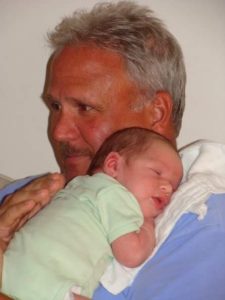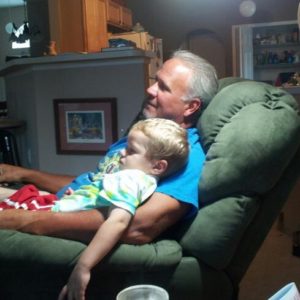Like a Child
Like a child wandering in a dark house… lost.
I go from room to room searching for you.
You are not here.
I am alone.
I sit in the corner – lost, afraid, crying.
Where are you?
Where is the light?
Will I always be here alone and scared?
~ Linda, January 13, 2014
When Bruce passed away, my world crumbled in that moment… so did so many other people’s… all those who love Bruce suddenly had a huge hole in our lives. There was one little guy, though, whose world also was crumbled but who was too small to express himself… that was our grandson. He and Bruce had such an amazing bond. From the first time, Bruce held him, and his little Boudreaux stopped crying, Bruce was hooked… and so was his Boudreaux.
Whenever those two were together, whether they were swimming, watching football, playing video games or on the boat, they were inseparable. They were “best buds,” and little Boudreaux could do no wrong in his Papa’s eyes.
When Bruce died, his little Boudreaux took it hard… harder than most of us realized at first. He was only 3 1/2 years old… too young to completely understand… too young to be able to put his questions, thoughts and feelings into words. For a short time, he even developed a stutter (which is actually quite normal for young children struggling with loss).
The first time he came to our house after Bruce’s death, he went looking for Bruce – either not understanding or convinced that Bruce was really here somewhere. He talked about missing Papa (still does) and how Papa is in heaven now. He and I finally decided that Papa must be his guardian angel (and always by his side). This seemed to bring him some comfort. However, it was still hard to watch him struggle… we all wanted to protect him from the pain that seemed too much for such a little guy. However, that was not the path we chose because…
As it turns out, in the books I read to work through my own grief, I learned that most of us learn how to grieve in our childhood. Here is what I mean…
As children we experience a variety of different losses, most of them are not considered “earth shattering” to an adult’s perspective, such as the loss of a favorite toy, loss of a security toy/blanket, loss of a pet, loss of a friendship, etc. However, to a child, these can actually be just as devastating as any “adult” loss. Why? Because these are “new” feelings and emotions, and children lack any type of perspective or ability to handle on their own. This must be learned.
When a child experiences any of these, and the adult(s) around them expects them to “get over it,” “stop making a big deal out of nothing,” “stop crying – tears won’t change anything,” “grow up,” or similar expectations, the child is taught not to express or work through the emotions of loss. Or, as well-meaning as it may be, sometimes the adult(s) will try to talk the child out of being sad by pointing out things to be happy about… Either way, the child is taught not to express or work through their emotions from the loss.
For the majority of the western world, this seems to be “standard practice.” Therefore, when we experience loss even as adults, this same attitude surrounds us, both from within ourselves and from the people the around us… It is what we know… It is how we respond… But it is not healthy.
In fact, that attitude is what made me feel so completely isolated for so long after Bruce died. Some of that attitude came from the world around me, and I was left feeling angry and resentful. However, most of that attitude came from within myself… I found I had to work through past losses that were pushed aside, before I could really and truly grieve the man I love in a healthy manner.
So how do we change this cycle? We start with the children… We allow children who experience loss to grieve and work through it, starting with the “simple” things. Then, when something bigger happens, a loss that is truly devastating, the tools are in place to work through the pain.
I am not saying that these are the only ways to do this, but these are the ways that have worked with my grandson through the years as he has dealt with the loss of his Papa and the other losses that life throws his way.
First and foremost, before Bruce passed away, we read books about loss to Boudreaux. Some of my favorites are the Berenstain Bears books and the Little Critter books. Because both series deal with the “normal losses” of childhood, they created a basis for conversations with our little guy about loss using situations or fears he already understood.
Another tactic we learned meant no longer trying to “talk him out of feeling sad.” We let him know that it is okay to feel what he feels, and it is okay to talk about it… We don’t mind listening. Don’t misunderstand, I am not talking about whining or have a temper tantrum. I am referring to loss, pain and genuine feelings that come from loss. These are different and a child should learn those differences, as well.
If our grandson doesn’t feel like talking, he also has a journal. (Because of his age, this is actually an artist’s sketch pad.) This is where he can write and/or draw whatever he is feeling. It is his, and it is private. If he wants to share it with us that is fine. If not, that is also fine… It is up to him.
Finally, when he is completely overwhelmed and wants to be alone, we let him. There are times when he simply goes to his room and shuts the door… sometimes he cries, sometimes he writes or draws. While it is hard to let him go there alone, we know he is developing the tools he needs to work through this stuff… and sometimes that requires solitude and reflection.
As his grandmother, it breaks my heart when I watch him struggle with the pain of loss. I know what it feels like, and I want to take that pain away… I want to fix it… but I don’t. Instead, I remain close by for support but…
I wait… I wait and let him do the work he needs to do because I know that is what is truly best for the grief of a child.
What about you? Have you had to help a child work through their grief? What worked for you? Or do you still need support in that area? Would you be willing to share your story or your thoughts?
Please do… This is our community. To share your thoughts and experiences go to the comments and leave your message.*
This is a weekly blog, for daily affirmations we have a Facebook page of the same name. Join us daily at www.facebook.com/peaceloveandgrief
* Be advised that all comments are subject to approval prior to posting. Any comments determined to be spam or not in accordance with the mission of this website/blog will not be approved or posted. Furthermore, any comments determined to be hostile in nature will be reported to the proper authorities. Thank you.


Hi Linda
I lost my husband only 16 weeks ago. It was also sudden, he was diagnosed with cancer on the 25th January 2016, and died on 18th February. I have since moved to Plantation Oaks, so that I could continue to afford to live, and change things to be able to cope. Nothing fills the emptiness I feel. I too walked around aimlessly trying to find comfort in things, but nothing brought me comfort. One day at a time they say. I had to learn to breath in those first few days, that in itself was a major task. Yet, I am here surviving, but my heart aches continuously. We take things for granted, that they will be forever. Nothing can prepare for the loss of your husband. I worked for Hospice of St Francis, we have a North Star Team, who deal specifically with children. Luckily I had no young children around like you.
Debbie, Thank you for sharing your story. I will keep you in my prayers. {{hugs}}